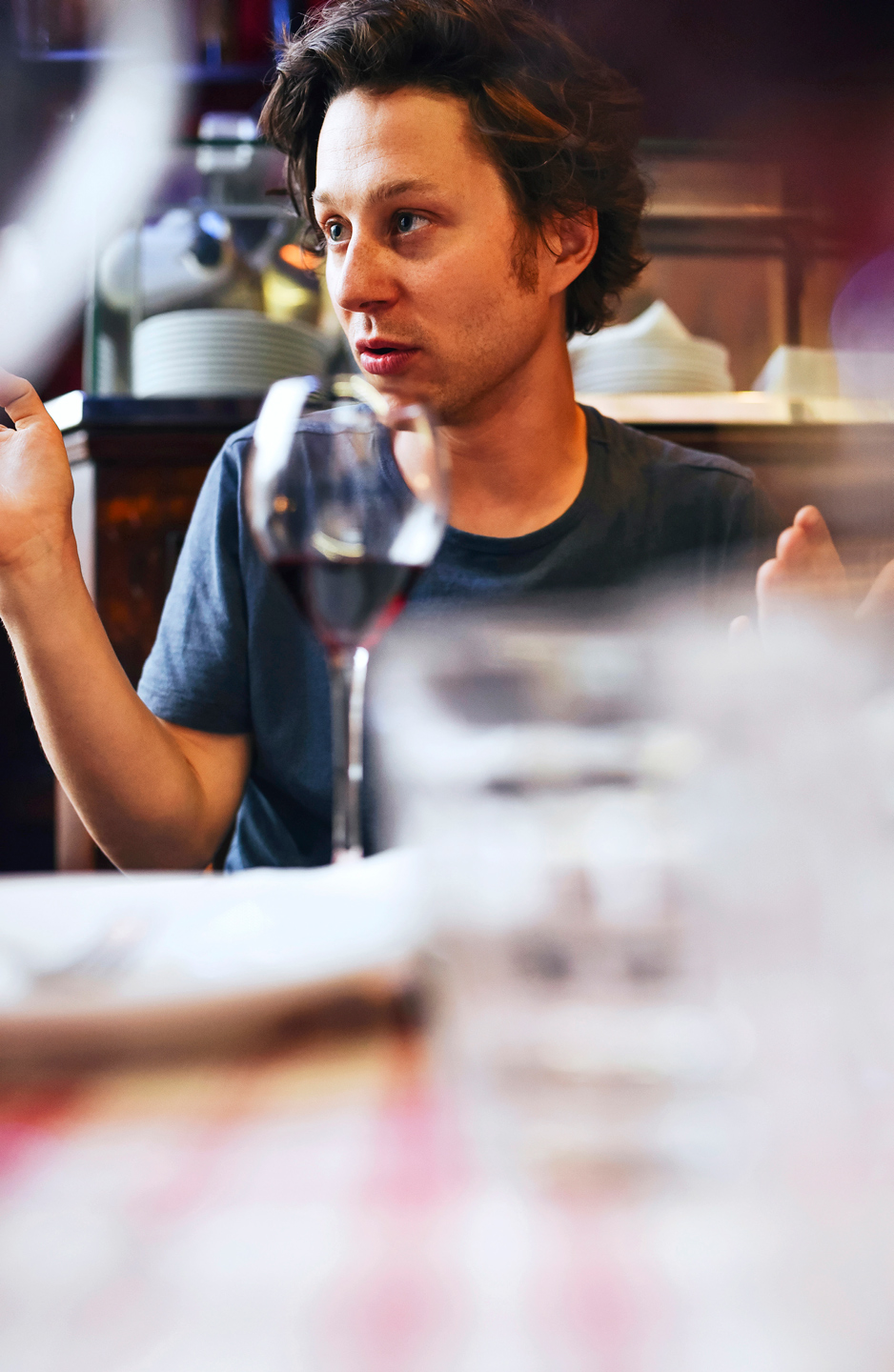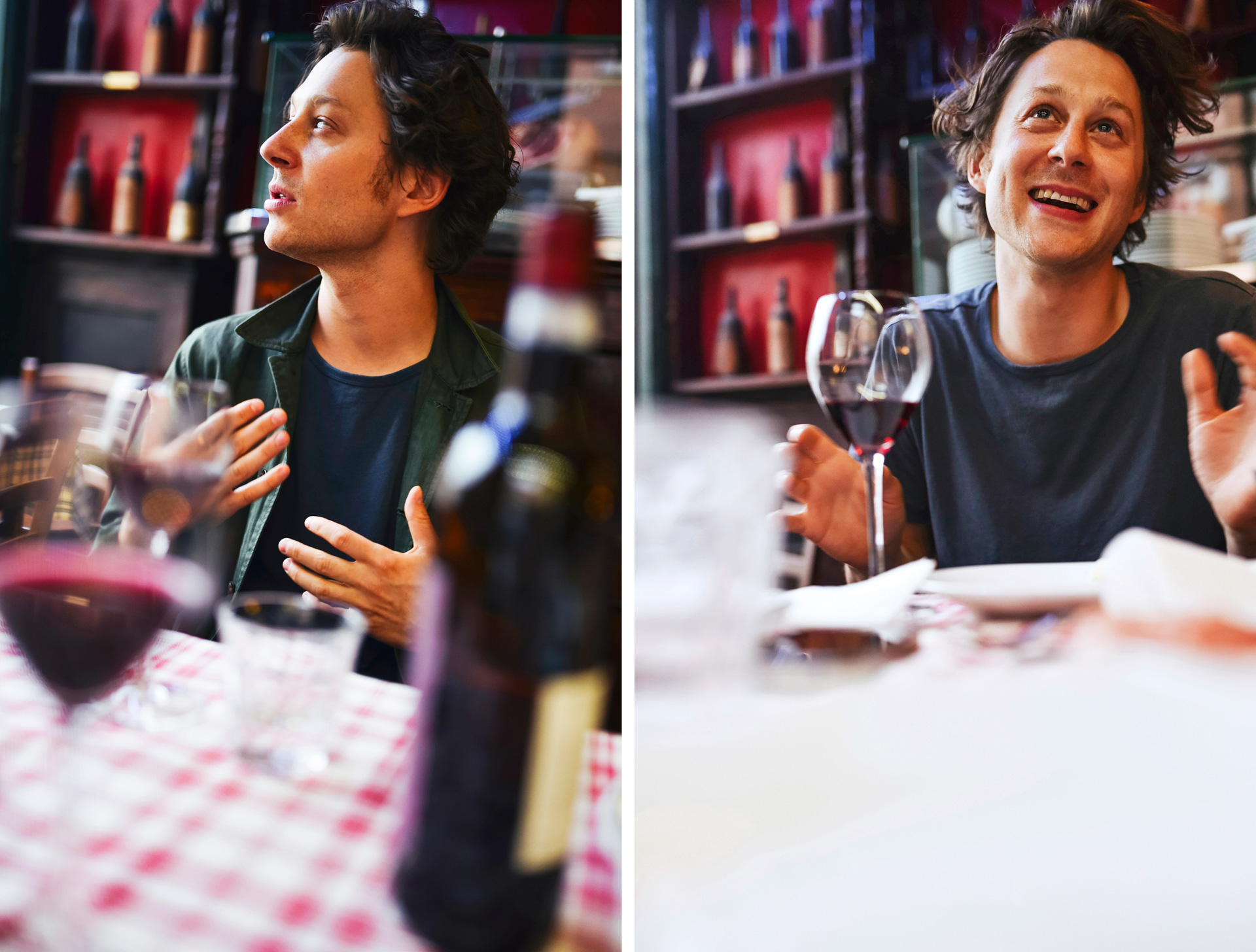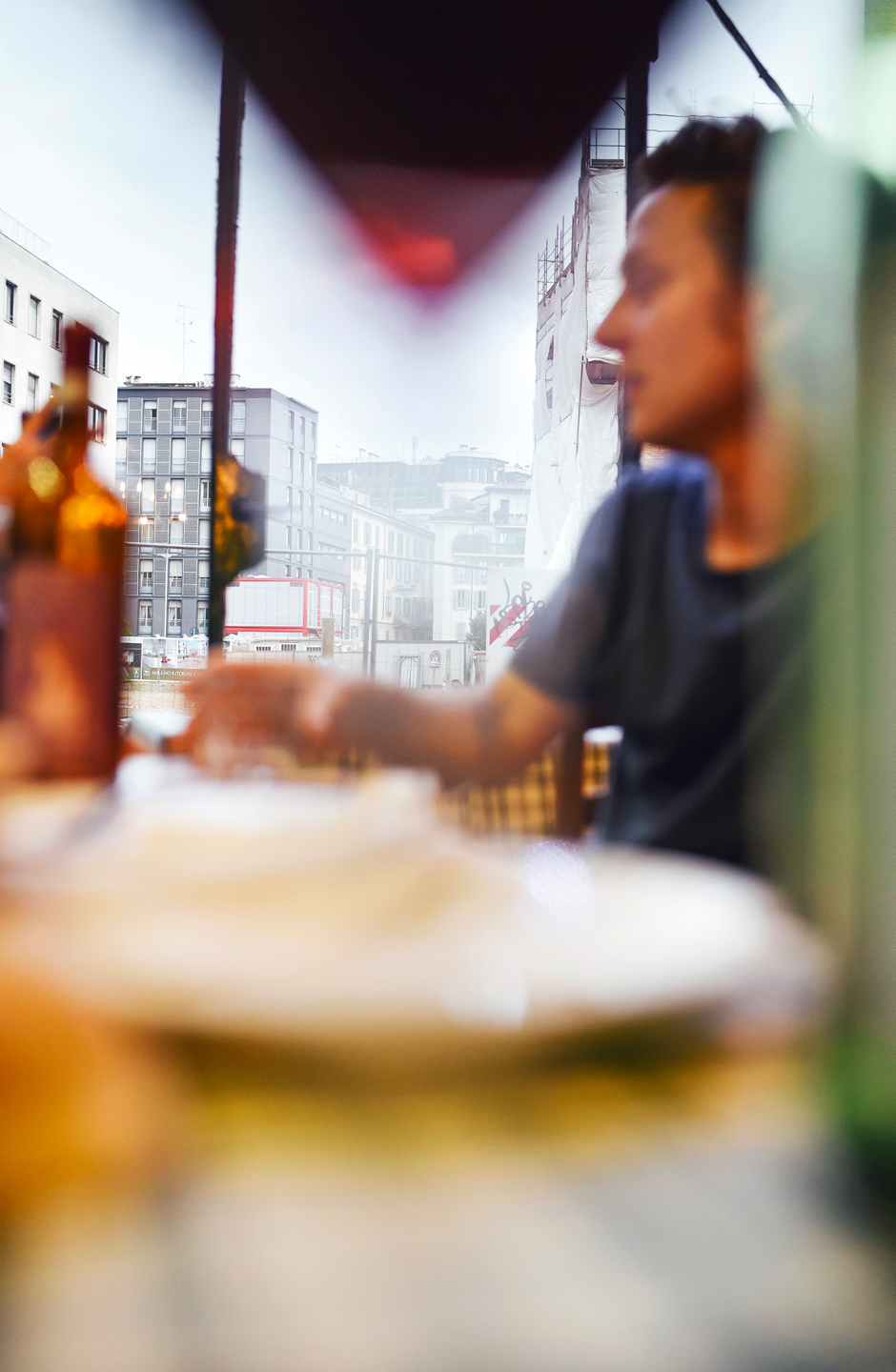Aperitivo with Arthur Arbesser
At Taverna Moriggi Via Morigi, 8 Milan
Conversation with Fabiana Fierotti Photography Piotr Niepsuj

-
FFSo, how is your collection for Pitti coming along, is it almost finished?
-
AAYes. It’s been really strange working on this new experience, it has meant adding an extra collection to the ones I already had planned. And it is a weird time because too many things have overlapped, all great things but very demanding both in terms of time and effort. It is a very intense time in my life, but I suppose that’s a good thing since it is usually either a terrible or wonderful time.
-
FFYou’re a bit of a location wizard, what have you chosen for Florence? Will there be a performance like in your last presentations?
-
AAWe have chosen a very classic, but really very beautiful location. This is the first time in my life that I have money to do something (laughs) and generally not having money brings out the best in people because you have to be innovative and take advantage of your network of friends and contacts. I always work very hard to ensure an excellent final result even though there’s almost never any budget (laughs), the lighting and music have to be right and the models, if there are any, have to work, because these are the things that you can’t disguise… oh and of course, the clothes have to be OK too… (he laughs and we toast). I have discovered that you can achieve more interesting things if you fight for them, I think, and I hope, that I will not be permanently struggling (after this interview, Arthur was named creative director of Iceberg, ed.) because it is very hard work but if I think about the people I see passing by jackets and ties, I feel so happy compared to them because I do what I love.
-
FFYou also need courage to take your life in hand and do what you love, it requires a lot of hard work but when you realise that, somehow, you’ve managed it, it gives you the drive you need to keep going.
-
AAFor me, this happened with the LVMH prize, where for the first time it wasn’t my friends who love me and Milan supporting me as an emerging designer, but people who didn’t know me and judged me for what I am and what I do.

-
FFHow did you begin working in the world of fashion?
-
AAMy first experience was with Armani, which lasted 7 years. It was a brilliant place to learn because it’s not the kind of company where you design collars, skirts or trousers for three years, but a real school where I personally learned how to interact with others, from production to Giorgio Armani himself.
-
FFWhere did you work in Armani?
-
AAEmporio Donna style department and Armani Jeans. When you work for a long time in such a big company, you learn exactly what you have to do to make the client happy, to the point that you get stuck in a loop and you lose your self-confidence. You can do everything you have learned very well, but you begin to doubt your other skills. I felt that my friends were proud of what they were doing while I felt unsatisfied, my goal was just to make it to the weekend, get totally wasted and return to reality around Tuesday.
-
FFAfter studying at Central Saint Martins in London, what made you move to Milan? What attracted you about this city?
-
AAI had a lot of fun in London, it was a wonderful time of my life, with a lot of great experiences and friends (he is distracted by a young man looking at his reflection in cars; Arthur uses interesting casting techniques for his shows, preferring unknown faces, Ed.) and fun. My final year at Saint Martins was tough, the rest not so bad because fortunately I have always had an excellent relationship with my teachers so it was a very friendly environment. My womenswear professor, for example, who was also an illustrator, asked me to model for his illustrations and he always used to ask his students… it must have been because I had long hair (laughs). He had a crazy house in north London, covered in drawings, he was Galliano’s professor too, he did all the illustrations for Dior. Of course, when you are friends, things are a lot more relaxed within the school environment. Anyway, the idea of moving to Milan came from my friend and housemate who had done an internship at Carol Christian Poell and had been really positive about the city. After London I felt I needed something smaller and more concrete, because that sort of thing doesn’t exist in London fashion companies. So I went to meet my friend Onca in Milan during Men’s Fashion Week and I was amazed by the parties and the free alcohol (he laughs). So I explored a bit and dropped my portfolio off at various showrooms and companies. I had a friend of a friend at Armani who offered to pass my portfolio on personally and in the end they called me for an interview and then hired me.
-
FFSo when you finished your education, your plan was to work for a large fashion house? You didn’t already want to create your own brand?
-
AANo, not at all! I needed to get my head straight and realise that I was really ready to ‘suffer’ for my dreams.
-
FFMind you, developing a more mature taste by working with a commercial brand is almost an obligatory phase…
-
AAIf I compare my graduate collection to what I do now, it is still very similar, perhaps I haven’t evolved that much stylistically (he laughs), but on the other hand, I am happy that I remained true to my taste. Things have to come naturally, if you force something or someone, things won’t work, the most important thing is to remain true to yourself.
If I compare my graduate collection to what I do now, it is still very similar, perhaps I haven’t evolved that much. But on the other hand, I am
happy that I remained true to my taste.
-
FFReturning to Milan, what is the mood at the Chamber of Fashion?
-
AAThere is a new president at the Chamber of Fashion (Carlo Capasa, ed.) and I am very happy about that. He has brought new life and something genuinely good may come out of it. Milan is having a revival.
-
FFMoving on to art, which is a very present topic within your collections, what are your influences or inspirations?
-
AABlinky Palermo, Maria Lassnig or other Austrian artists I feel particularly close too. I have my old archive of artists that continue to give me new stimuli, but then I think that most things stem from conversations with friends, dinners or other intimate moments. For example, the inspiration for the September show will be Balthus and his world because in March, at LVMH, I met Cordula Reyer, former model turned journalist, who had interviewed Balthus’s widow and told me about this beautiful Japanese woman and her wooden house in Switzerland. I was interested, I did some research and that’s where everything started.
-
FFIs there an emerging designer that you particularly admire here in Italy?
-
AAThere are some that I really admire because they are developing their business incredibly in terms of turnover, such as Vivetta. She has her own life, her husband, her child, her character, her personality, but she also manages to handle her company. She does her thing and is not like others who only want to sell. When you are an emerging designer, this cannot be your sole motivation for continuing. At the beginning you need to be driven by passion and madness, because it’s so tough.
-
FFIt is certainly very difficult to emerge in Milan and paradoxically it is even harder if you are Italian.
-
AAYes, but even if you are not Italian you still come up against obstacles because you realise that it’s not just about loving this thing, you are seen as somebody taking the place of a ‘real Italian’. The guys from Come For Breakfast are lovely too, we need an international vision, the whole thing has to work everywhere, you can’t just be popular here in Italy. Vivetta is the complete opposite of what I do but I admire her way of working.

-
FFTell me a bit about the LVMH prize, what was it like taking part?
-
AAWell, I entered like everybody else and then I was at work one day when I saw I had a missed call from a French number. I called back and heard this violin music and a voice saying “Welcome to LVMH” (he laughs). I finally got through to someone and they told me I was through to the first round. There were 26 of us and we had to do two pre-selection days where we presented our collections. It is a very stressful situation, much more so than a show or performance because you have to speak to everybody and explain a million things, but I really liked it. It was like a fair, everyone had their little stand and it was fun because you saw everybody arrive and prepare their things. It was like being on X-Factor. I had some photographs from my lookbook printed in A3 and hung on the walls of my stand and I was really proud, I thought it was a great idea… Then I saw people arriving with rolls of wallpaper, plants and furniture, or hanging fur on the walls (laughs). In those two days, 45 ‘experts’ came to view our collections, from Olivier Rizzo to Patrick Demarchelier and Natalia Vodianova, so the real elite of the fashion world. This time it was such a surreal situation that the only thing you could do was behave normally. It was like being grilled, either you resist or you don’t, and I was shattered at the end of it but it was fun and interesting. The great thing is that LVMH gives you a chance to actually meet these people, speak to them and play your hand well so they might remember you.
-
FFWhat was your relationship like with the other finalists?
-
AAThe problem was that it was so intense that you couldn’t really interact much with the others because you had to stay at your stand. There wasn’t any time to see or do anything else. There were some lovely Americans from the East Coast next to me and I already knew Craig Green from London, we were on the jury together for the show at Central Saint Martins last year. Jacquemus has an incredible self-confidence, especially given his age. He’s very good-looking (laughs).
LVMH prize, it was like a fair, everyone had their little stand and it was fun because you saw everybody arrive and prepare their things. It was like being on X-Factor.
-
FFOk, that’s enough about work, what do you think is going to happen for you this summer or in the coming months? What would your dream be?
-
AATo be honest, I don’t really want to talk about the prize because I don’t know anything (Arthur didn’t win the LVMH prize unfortunately, but he was offered the role of Creative Director for Iceberg shortly afterwards, ed.). I obviously have a certain self-awareness about what I do, I’m no Jacquemus, I’m quite self-critical on all levels, not only at work. It’s already amazing that I got into the final eight. My financial situation is so dire that it would be amazing to win the first or second prize, not so much for the fame but to help me with a few economic problems. There is also an Austrian government programme that supports me financially (since June) because I have only really sown seeds up until now and I feel that it is the moment to harvest. My life dream would be to keep on doing what I am doing now. I hope things go well. I have a chance to show in Milan in September which is a really big thing for me.
-
FFI always thought that it was a personal choice not to show…
-
AANo, it’s just that at the beginning you don’t have anywhere near the financial means to show. Anyway, I want to show in my own way, telling a story, with real content. I think there is a lot of emptiness nowadays. It is always nice to leave something with the people who come and see your show or presentation.
-
FFDo you go back to Austria often?
-
AANo, not that much to be honest. One of my close friends is going to start helping me with my work now and I’m so happy because there are many parts of it that I can no longer keep on top of.
-
FFAre you going on holiday this year?
-
AAA group of friends have basically forced me to go to Greece with them, to Hydra for two weeks in August. They’ve organised everything and told me “all you have to do is show up, we’ll do the rest.”